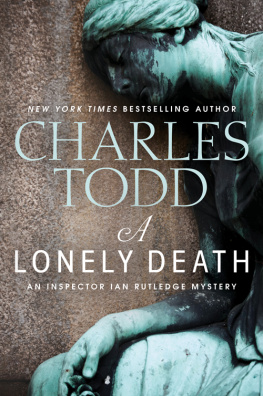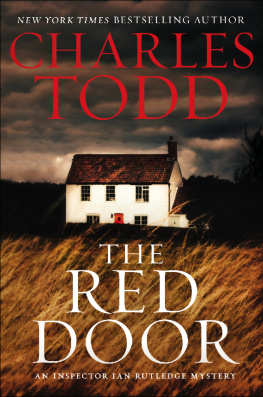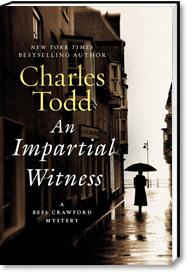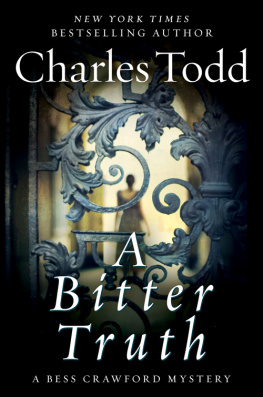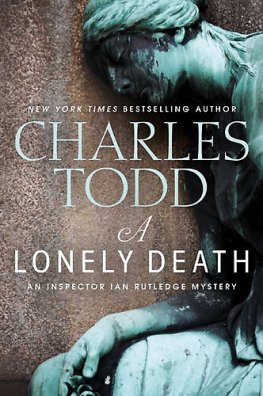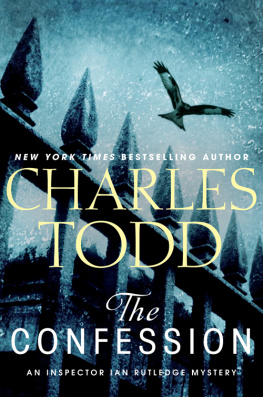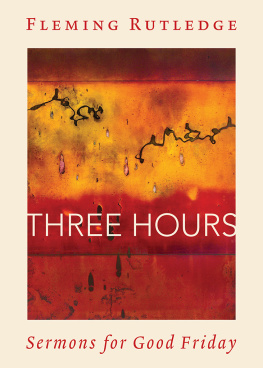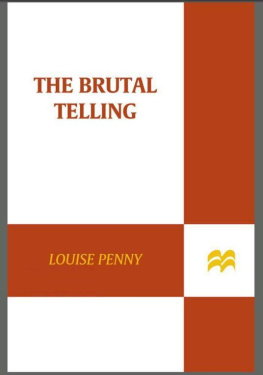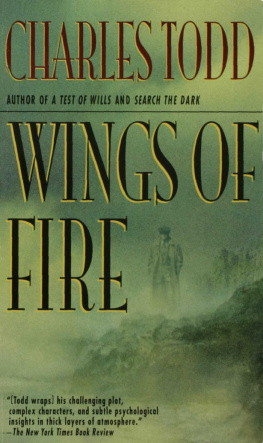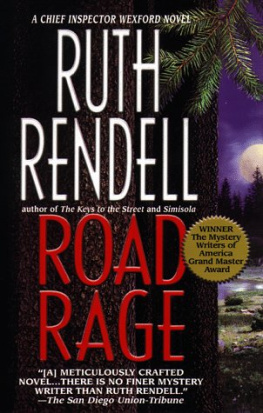1
T he murder appeared to be a crime of passion, the killer having left a trail of evidence behind him that even a blind man might have followed.
It was the identity of the victim, not the murderer, that brought Scotland Yard into the case.
No one knew who she was. Or, more correctly perhaps, what name she might have used since 1916. And what had become of the man and the two children who had been with her at the railway station? Were they a figment of the killers overheated imagination? Or were their bodies yet to be discovered?
The police in Dorset were quite happy to turn the search over to the Yard. And the Yard was very happy indeed to oblige, in the person of Inspector Ian Rutledge.
It began simply enough, with the London train pulling into the station at the small Dorset town of Singleton Magna. The stop there was always brief. Half a dozen passengers got off, and another handful generally got on, heading south to the coast. A few boxes and sacks were offloaded with efficiency, and the train rolled out almost before the acrid smoke of its arrival had blown away.
Today, late August and quite hot for the season, there was a man standing by the lowered window in the second-class car, trying to find a bit of air. His shirt clung to his back under the shabby suit, and his dark hair lay damply across his forehead. His face was worn, dejection sunk deep in the lines about his mouth and in the circles under tired eyes. He was young, but youth was gone.
Leaning out, he watched the portly stationmaster helping a pale, drooping woman to the gate, the thin thread of her complaining voice just reaching him. such hardship, she was saying.
What did she know about hardship? he thought wearily. She had traveled first class, and the leather dressing case clutched in her left hand had cost more than most men earned in a month. If they were lucky enough to have a job.
There had been no work in London. But hed heard there was a builder hiring down Lyme Regis way. The train was a luxury Bert Mowbray couldnt afford. Still, jobs didnt wait, and you sometimes had to make the extra effort. He refused to think what he would do if hed guessed wrong and there was nothing at the end of his journey but a grim shake of the head and No work. Sorry.
His gaze idly followed a porter awkwardly trundling his cart fall of luggage across the platform, followed by a pair of elderly women. The cars were already jammed with families on their way to the seaside, but room was found for two more. Then his eye was suddenly caught by another woman outside one of the cars farther down the train, kneeling to comfort a little girl who was crying. A boy much younger, not more than two, clung to the trouser leg of the man bending protectively over them, speaking to the woman and then to the little girl.
Mowbray stared at the woman, his body tight with shock and dismay. It couldnt be Mary
My God! he breathed, Oh, my God!
Turning from the window, he lunged for the door, almost knocking the wide-brimmed hat from the head of a startled farmers wife who couldnt get out of his way fast enough. He tripped over her basket, losing precious seconds as he fought for his balance. Her companion stood up, younger and stouter, and demanded to know what he thought he was doing, her red, angry face thrust into his. The train jerked under his feet, and he realized it was moving. Pulling out
No! Nowait! he screamed, but it was too late, the train had picked up momentum and was already out of the small station, a few houses flashing by before the town was swallowed up by distance and fields.
He was nearly incoherent with frustration and the intensity of his need. He yelled for the conductor, demanding that the train be stoppednow!
The conductor, a phlegmatic man who had dealt with drunken soldiers and whoring seamen during the war years, said soothingly, Overslept your stop, did you? Never mind, theres another just down the road a bit.
But he had to restrain Mowbray before they reached the next stationthe man seemed half out of his mind and was trying to fling himself off the train. Two burly coal stokers on their way to Weymouth helped the conductor wrestle him into a seat while a prim-mouthed spinster wearing a moth-eaten fox around her shoulders, never mind the heat, threatened to collapse into strong hysterics.
Mowbray had gone from wild swearing and threats to helpless, angry tears by the time the train lurched into the next town. He and his shabby case were heaved off without ceremony, and he was left standing on the station platform, disoriented and distraught.
Without a word to the staring stationmaster, he handed in his ticket for Lyme Regis and set off at a smart pace down the nearest road in the direction of Singleton Magna.
But the woman and children and man were gone when he got to the town. And no one could tell him where to find them. He went to the only hotel, a small stone edifice called, with more imagination than accuracy, the Swan, demanding to know if a family of four had come in by the noon train. He stopped at the small shops that sold food and the two tearooms nearest the station, describing the woman first, then the children and the man. He badly frightened one clerk with his furious insistence that you must have seen them! You must!
He tracked down the carriage that served as the town taxi and angrily called the driver a liar for claiming he hadnt set eyes on the woman or the man, much less the children.
Theyre not here, mate, the middle-aged driver declared shortly, jerking a thumb toward the back. See for yourself. Nobody like that came out of the station today while I was waiting. If you was to meet them here, its your misfortune, not mine. May be that you got your dates wrong.
But they cant have vanished! Mowbray cried. Ive got to find them. The bitchthe bitch!theyre my children, shes my wife! It isnt rightI tell you, if shes tricked me, Ill kill her, I swear I will! Tell me where shes got to, or Ill throttle you as well!
You and who else? the man demanded, jaw squared and face flushed with an anger that matched Mowbrays.
All afternoon he haunted Singleton Magna, and a constable had to caution him twice about his conduct. But the fires of anger slowly burned down to a silent, white-hot determination that left him grim-faced and ominously quiet. That evening he called at every house on the fringes of the town, asking about the woman. And the children. Had they come along this road? Had anyone seen them? Did anyone know where theyd come from, or where they were going?
But the town shook its collective head and shut its collective doors in the face of this persistent, shabby stranger with frantic eyes.
Mowbray spent the night under a tree near the station, waiting for the next days noon train. He never thought of food, and he didnt sleep. What was driving him was so fierce that nothing else mattered to him.
He stayed in Singleton Magna all that day as well, walking the streets like a damned soul that had lost its way back to hell and didnt know where to turn next. People avoided him. And this time he avoided people, his eyes scanning for one figure in a rose print dress with a strand of pearls and hair the color of dark honey. By the dinner hour he had gone. Hardly anyone noticed.
When a farmer discovered a womans body that evening, the blood from her wounds had soaked deeply into the soil at the edge of his cornfield, like some ancient harvest sacrifice. He sent for the police; and the police, with admirable haste, took one look at her there on the ground and ordered a warrant for the arrest of the man who had been searching for her. Although there was no identification on the body, they were fairly sure she wasnt a local woman. And the way her face had been battered, there had been a hot, desperate anger behind the blows. The missing wife, then, had been found. All that was left was to see that her murderer was brought to justice.


